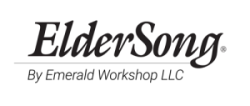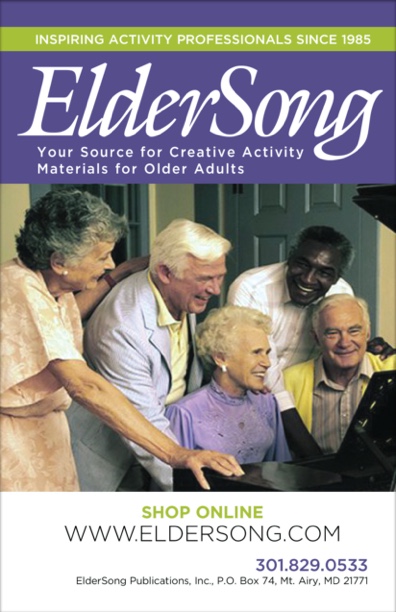Today’s generation of older adults grew up with an appreciation for family and home, neighbors and community. Traditions and rituals were important in family life. For instance, family members shared an evening meal at the end of each day. Later, they would often gather around the radio to listen to their favorite programs or play board games and cards around the kitchen table. These practices were especially important during hard times such as the Depression and World War II.
Music was often associated with many of these family activities. Consider the following: Did Grandma hum Irish folk songs as she prepared a favorite ethnic dish? Did your uncle strum his guitar on the back porch on warm summer evenings? Did you stroll from house to house singing Christmas carols during the holiday season? Did you jitterbug at a local dance hall every Saturday night?
Music touches the lives of families in countless ways–in everyday life, at holidays, on special occasions, and through celebrations in the home, school, or community. Ask your participants: Were you exposed to different types of music and various artists at a young age? How did music impact the life of your family? Begin talking about music in the context of family life by asking participants to share memories associated with the following scenes.
- A school yard full of children singing “London Bridge”
- A family parlor filled with radio music from the Great Depression era
- A stadium full of Yankee baseball fans singing the national anthem
- A soda shop with a juke box playing the Big Band sound of Glenn Miller
- A convention hall full of FDR delegates clapping to “Happy Days Are Here Again”
- A USO canteen with teenage girls and soldiers dancing to “Boogie Woogie Bugle Boy”
- A front room with a pump organ around which a family is singing a favorite hymn
- A family station wagon resounding with the sound of “Take Me Out to the Ball Game”
- A radio station airing a live country music program from the Grand Ole Opry
- A movie house showing Bright Eyes with Shirley Temple singing “On the Good Ship Lollipop”
What music traditions shaped the lives of your family? Ask participants to talk about the impact of the family piano, radio, phonograph, juke box, and transistor on their everyday lives. How did music inspire, comfort, and encourage them during the days of the Great Depression and World War II? Older adults who grew up in the first half of the 20th century share a rich musical heritage – ragtime and blues, singing cowboys, radio crooners, parlor songs, “sweet” bands, war songs, Big Band/swing sound, theatre musicals, Sousa marches, Ol’ Blue Eyes, and more.
Encourage participants to reminisce about Christmas dinner, tree trimming, Christmas gifts, and other special family holiday traditions. Ask: Why is it important for generations to get together and celebrate festive traditions? What annual holiday traditions had the deepest meaning for you and your family? Chat about favorite holiday traditions from the 1930s, 1940s, and 1950s. Has anyone in the group continued to watch holiday classics from the 1940s, such as It’s a Wonderful Life, Holiday Inn, and Miracle on 34th Street? Did they have a favorite 1950s decoration – a flocked tree with blue ornaments? Serve hot apple cider and cookies as you talk about some icons of the season.
MUSIC TRIVIA QUIZ
Today’s older adults were introduced to many types of music and various singers through radio, records, and movies. Singing, dancing, playing/listening to music became favorite pastimes. Reminisce about styles of music in the 20th century and artists associated with them. Examples: blues – Bessie Smith jazz – Louis Armstrong and Duke Ellington Big Band/swing – Glenn Miller and Tommy Dorsey. Teen singing idols in the 1930s, 1940s, and 1950s will generate some interest among your participants. Mention these heartthrobs of schoolgirls and bobbysoxers – Rudy Vallee, Frank Sinatra, and Elvis – and you’re likely to hear a few giggles. Challenge your group to some music trivia, taken from the I Hear Music activity guide, then serve a cake decorated with music notes.
- What is the piano’s complete name? Pianoforte
- From what city did the Grand Ole Opry originate? Nashville, Tennessee
- What is the formal name for the fiddle? Violin
- What big band trumpeter’s theme song was “Ciribiribin”? Harry James
- What did Kate Smith say at the beginning of her radio shows? “Hello, Everybody”
- What did Arthur and Kathryn Murray teach? Ballroom dancing
- What patriotic song mentions macaroni? “Yankee Doodle”
- What singing sisters sang “Beer Barrel Polka” and “Boogie Woogie Bugle Boy”?Andrews Sisters
- Ragtime music was a forerunner to what musical style? Jazz
- What city will always be associated with the singer Tony Bennett? San Francisco
THOUGHT FOR THE MONTH
“Music is the universal language of mankind.” ~ Henry Wadsworth Longfellow
“MUSIC IN FAMILY LIFE” written by Sue Hansen. © 2006 ElderSong Publications, Inc. All rights reserved.
Reprint Policy: To reprint or republish all or portions of this entry, you must acquire written permission and agree to link back to the original source. Please contact us at [email protected] to obtain permission.


